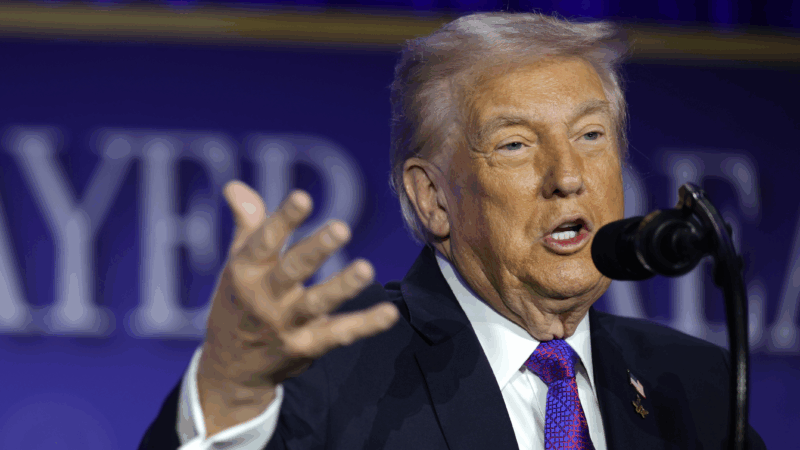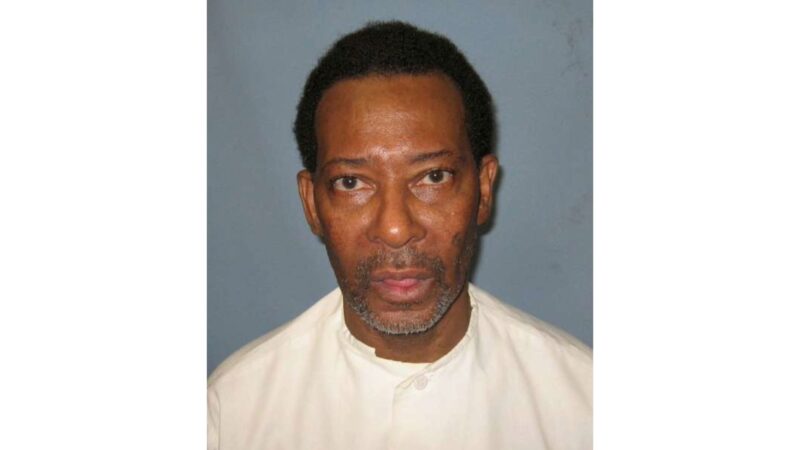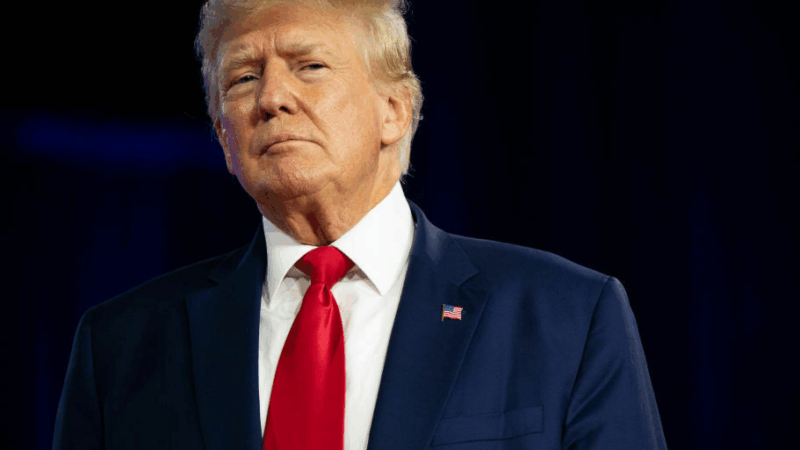The Federal Election Commission is down to 2 members. So its work is at a standstill
The Federal Election Commission, an independent agency tasked with regulating campaign finance, has lost yet another member.
But the FEC has actually been without a quorum — at least four members — for months, leaving the agency unable to do much of its work.
Republican Trey Trainor told the Washington Examiner that he would be resigning as commissioner, effective Friday. Trainor did not reply to NPR’s request for comment.
This is now the third departure of a commissioner during President Trump’s second term in office, following the exit of fellow Republican Allen Dickerson and Trump’s firing of Democrat Ellen Weintraub, which she and many experts say was improper.
“He fired me without cause,” Weintraub told NPR this week. “He fired me without precedent … I was eligible to be replaced. So, I expected that was going to happen. What I did not expect was that I was just going to be fired and no one would be put in my place.”
And because no one has been appointed in her place, or Dickerson’s, the commission – which already had a vacancy when Trump entered office – can’t meet or vote on anything.
Here’s what to know about the FEC:
Without a quorum of commissioners, what is the FEC able to do?
The short answer is that the FEC hasn’t been able to do any policy work for months, but some of the day-to-day functions continue.
Weintraub — who served on the FEC since 2002 and is now a senior fellow at End Citizens United, a political action committee working to reverse a U.S. Supreme Court decision that struck down some campaign finance limits — said there is little to nothing commissioners can do without a quorum.
“It takes four votes to issue any penalties, to start any investigations, to conclude any investigations, to start any audits, to issue any rules, to answer any questions — you need four votes at the FEC to get pretty much anything of substance done,” she said. “And once the commission runs down, down below that magic number of four, it really cannot do its job.”

But the commissioners aren’t the only people working at the agency, Weintraub said.
Some core functions continue. Candidates and political groups still have to report their finances and other information to the FEC, regardless of whether there is a quorum.
“Fortunately, there are things that the staff can do without input of commissioners,” Weintraub said. “They can maintain the database, which is, of course, the core function of the agency, is to make money in politics transparent to the American people so that the American people will see where the money’s coming from and where the money’s going.”
Is a lack of quorum a new problem for the FEC?
Not lately!
Commissioners leaving and not being replaced in a timely manner has “become a recurrent problem for the FEC,” according to Dan Weiner, who served as senior counsel to Weintraub at the FEC from 2011 to 2014 and is now director of the elections and government program at the Brennan Center for Justice.
“This is the third time it’s happened in the last decade,” he said. “And it can often lead to prolonged periods where the commission lacks a quorum and is essentially inactive.”
Weiner said what is different about this time, though, is that the White House has been openly hostile to the role of independent agencies. Trump has sought to rein in their authority and fire numerous officials at independent agencies.
“And so that adds a sort of new dimension here, right, where you’ve got the commission without a quorum,” he said. “And then also this astonishing assertion of presidential power. And it’s unclear how that is going to play out.”
Of the two remaining FEC commissioners, neither is a Republican. Does that matter?
Because there is no quorum, the absence of Republican commissioners doesn’t matter all that much. This is likely part of why Trump hasn’t been in a rush to fill vacant seats.
But there is at least one cost to not having Republican representation, says Bradley Smith, who served as a Republican appointee on the commission from 2000 to 2005 and is now chair of the Institute for Free Speech.
He said with Trainor’s departure, the party has been left “without a spokesperson” at the FEC.
“Oftentimes, people call the commission — reporters and so on — for comment on campaign finance matters,” Smith said. “And the Republicans and Democratic commissioners often have somewhat different takes on the issues.”
Without a quorum, are campaign finance laws being enforced?
Without a quorum, complaints and investigations at the FEC are pretty much at a standstill.
Weintraub says complaints might be rolling in pretty much every day, but no action can be taken. She says this creates a situation in which people who want to follow the law will be unable to get proper guidance — and “political actors who are inclined to be aggressive in their interpretations of law are not going to get any pushback.”
“There’s no cop on the beat,” she said. “And we will once again see billions of dollars raised and spent in the upcoming elections. And at the moment, there is no cop on the beat to make sure that it’s all being done in a lawful and transparent way.”
But Smith said it is a “common misconception” that without a quorum people can get away with breaking the law.
“The fact that nobody’s there at the FEC, that there’s not a quorum at the FEC, doesn’t mean the FEC can’t act on it,” he told NPR. “They’ve got a seven-year statute of limitations for most offenses. So, you can be caught. There’s lots of time for the FEC to bring a case.”
How would things change if the FEC gets a quorum again?
It depends who you ask.
Adav Noti, a former FEC general counsel and now executive director of the Campaign Legal Center, says even with a quorum, the commission has historically done very little to regulate campaign finance violations.
He said this is due to the fact that the commission often deadlocks on its votes. No political party is allowed to be represented by more than three of the six seats on the FEC, and all rulings require at least four votes.
“The sad reality is that the Federal Election Commission was not accomplishing very much of any value, even when it had a full complement of commissioners,” he said. “So, the further departure of yet another commissioner, although it’s a terrible sign for the state of election regulation in our country, doesn’t on the ground change all that much.”
This is a characterization that Smith also takes issue with, though. He said sometimes groups don’t agree with the result of a complaint, but that doesn’t mean the FEC isn’t doing its job.
“I think the FEC takes a bum rap there,” he said. “If the FEC doesn’t take action we shouldn’t presume that they’re not enforcing the law.”
But Noti argues that campaign finance limits have been on the decline since the Supreme Court’s Citizens United decision — and the FEC has done little to reverse the trend.
“There have been many opportunities along the line for either the FEC or for Congress to take some sort of action and sort of right the ship and mitigate the damage to the system that’s come from the Citizens United opinion and put some guardrails around corporate spending and billionaire spending and other special interest spending in elections,” he said. “But Congress hasn’t done that and the FEC hasn’t done that. And as the years have gone on, the FEC has actually gone the other direction and become more and more toothless.”
Can anyone else enforce campaign finance laws?
Noti said the Department of Justice has “in theory, an oversight role,” but he says the Trump administration has slashed DOJ staff and been “strongly opposed to enforcement of election laws.”
There is, however, private action, which groups like Noti’s partake in all the time.
Congress requires that private parties address their issue through the FEC first — and they are able to sue the FEC if they feel a wrong call was made. But that process can take a long time.
Stuart McPhail, director of campaign finance litigation at Citizens for Responsibility and Ethics in Washington, or CREW, said Congress created a sort of built-in safety valve for when the FEC doesn’t have enough votes to defend itself in these cases. In those instances, these lawsuits can bypass the agency if it is not properly staffed, or lacking a quorum.
“The loss of quorum does not prevent these private suits,” McPhail told NPR in a statement. “Rather, it speeds them up, allowing litigants to leapfrog the agency process. The FEC’s loss of quorum promises the potential for real enforcement that has been sorely missing.”
McPhail also takes the view that even when the commission has a quorum, “it rarely enforced the law and instead acted to protect the secrecy of dark money sources.” He said often bad actors would end up with a fine “that would be pennies on the dollar” against the large sums of money flooding American elections.
“Congress anticipated that the government would typically underenforce the law against itself, so it also gave private litigants a vital role in bringing their own lawsuits that could unmask these powerful players,” he said.
Trump’s harsh immigration tactics are taking a political hit
President Trump's popularity on one of his political strengths is in jeopardy.
A drop in CDC health alerts leaves doctors ‘flying blind’
Doctors and public health officials are concerned about the drop in health alerts from the Centers for Disease Control and Prevention since President Trump returned for a second term.
Photos: Highlights from the Winter Olympics opening ceremony
Athletes from around the world attended the 2026 Winter Olympics opening ceremony in Milan.
Alabama sets execution for man in auto parts store customer’s death
Gov. Kay Ivey on Thursday set a March 12 execution using nitrogen gas for Charles “Sonny” Burton. Burton was convicted as an accomplice in the shooting death of Doug Battle, a customer who was killed during an 1991 robbery of an auto parts store in Talladega.
Trump posts racist meme of the Obamas — then deletes it
Trump's racist post came at the end of a minute-long video promoting conspiracy theories about the 2020 election.
Hyperpop, poetry, BDSM or a Moroccan rave allegory? Choose your own cinematic adventure
Charli xcx is on more screens this weekend while Pillion tells a sweet BDSM story.







